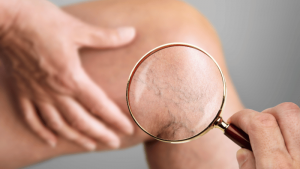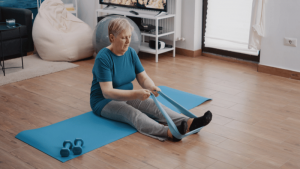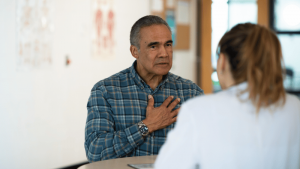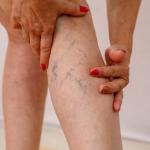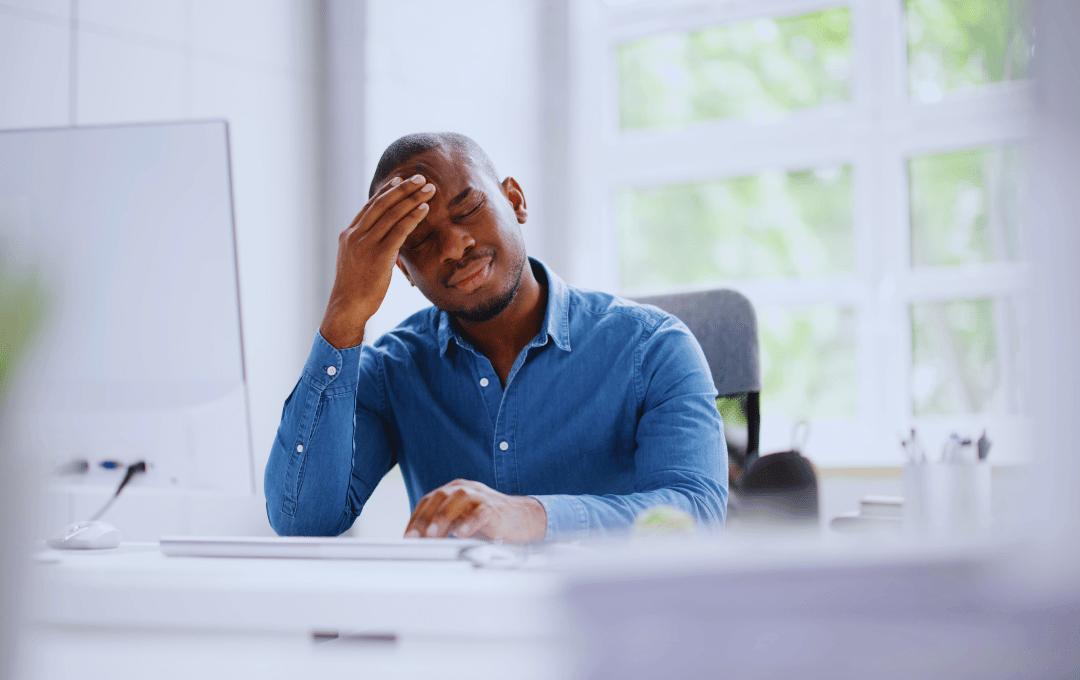
The effects of stress are often associated with issues like reduced sleep quality and headaches, suggesting its impact can extend beyond mental health. Stress can affect heart health and circulation, potentially leading to vein damage. If left untreated, this may worsen over time, leading to discomfort, swelling, and varicose veins.
USA Vein Clinics specializes in diagnosing and treating vein conditions that can worsen with stress. Our minimally invasive vein treatments are designed to improve circulation and relieve symptoms. However, it’s important to understand the effects of stress on vein health and how to prevent it from worsening symptoms like varicose veins.
Learn More About Varicose Veins
Can Stress Affect Your Veins?
While many people understand the link between stress and mental health, fewer realize that chronic stress can also affect physical health, including vein function. During stressful times, it’s common to notice physical changes in the body, such as an increased heart rate, sweaty hands, or stomach issues. Over time, the effects of stress can weaken veins, impair circulation, and contribute to the development of vein-related problems.
How Stress Impacts Varicose Veins and Spider Veins
Chronic stress can affect the body physically, increasing the risk of chronic venous insufficiency, the condition that causes the appearance of varicose and spider veins. This is because when you’re stressed, the body releases adrenaline and cortisol hormones, making your heart beat faster and blood pressure climb. High blood pressure can damage blood vessels and contribute to poor circulation, leading to the appearance of varicose veins and spider veins.
Varicose Veins and Stress
Varicose veins are twisted, swollen veins that develop when vein valves become damaged and cannot efficiently return blood to the heart. This leads to blood pooling in the legs, causing swelling and bulging veins. Varicose veins often appear as blue or purple bulging veins, primarily in the lower legs or ankles, where they may cause pain and discomfort.
Stress can worsen this condition by increasing blood pressure and further impairing circulation, which may intensify symptoms. A vein health screening is a great way to assess varicose veins and determine possible treatment options.
Spider Veins and Stress
Spider veins are small, damaged veins visible just below the skin’s surface, often forming a web-like pattern. Spider veins can be an early sign of vein disease.
The hormonal response to stress raises blood pressure and increases strain on the veins, which can contribute to the development of spider veins. If spider veins are present, chronic stress can worsen their appearance and discomfort.
Reach out to USA Veins Clinics to schedule a vein health appointment.
Signs Stress May Be Affecting Your Veins
Stress can manifest in various ways when it comes to your veins. Here are some key signs to watch for:
- Swelling in the legs or ankles
- Pain in the legs
- A heavy feeling in the legs
- Varicose veins
- Spider veins
- Leg cramps
- Skin discoloration
- Itching around the veins
Our vein symptom quiz can provide insights into your vein health, but some conditions may not show early symptoms. A consultation with a vein specialist is the best way to diagnose and treat underlying vein conditions, such as chronic venous insufficiency.
Managing Vein Health Affected by Stress
Managing stress can positively impact overall well-being, including circulation and vein health. Learning to manage stress can help improve blood flow; however, it will not cure issues with vein health. Medical intervention will help alleviate symptoms and reduce the appearance of varicose and spider veins.
Ways to Reduce Stress and Support Vein Health
- Exercise: Exercise tones the muscles to help push blood back to the heart. For some, exercise also releases endorphins which reduces stress.
- Yoga and relaxation: Yoga promotes mindfulness that can help ground people feeling stressed. Some studies have shown that yoga can stretch the blood vessels, reducing the risk of poor circulation.
- Meditation and deep breathing: These techniques can lower heart rate and blood pressure, putting less stress on your veins.
- Quality sleep: Getting enough rest reduces stress and maintains good circulatory health.
- Healthy Diet: Some vitamins and nutrients have anti-inflammatory properties that can boost vein health.
- Hydration: Drinking water allows the muscles to work efficiently, balances stress hormones, and thins the blood to promote blood circulation.
The Importance of Regular Check-Ups
Scheduling routine vein health check-ups is one of the best ways to detect vein issues early on. During a vein screening, a doctor can assess your symptoms and identify any concerns before they worsen. Many vein conditions can be managed or reversed with early intervention and treatment.
Vein Treatment Options for Lasting Symptom-Relief
While stress management may help alleviate some symptoms, medical treatment may be necessary to address vein issues fully. USA Vein Clinics offers a range of minimally invasive, office-based treatments that can alleviate vein-related pain and discomfort without surgery.
Why Early Intervention Matters
If left untreated, stress-related vein issues may progress into more serious conditions such as venous insufficiency, blood clots, and venous ulcers. Early detection and treatment from a vein specialist can help prevent additional complications.
Don’t wait until symptoms worsen—schedule a vein consultation today.
Protect Your Veins with USA Vein Clinics
USA Vein Clinics is here to help you manage your vein health. Our trusted doctors can diagnose and provide treatments for stress-related vein health conditions. We have nationwide locations and work with most insurance plans. You can verify your insurance when you schedule online or call 888.768.3467.
FAQs
How can I tell if my vein problems are stress-related?
Stress-related vein issues may present as leg heaviness, cramping, swelling, or the appearance of varicose and spider veins. A vein screening can help determine the exact cause.
Is stress more likely to worsen vein health in certain people?
Individuals with a history of venous insufficiency, varicose veins, or a genetic predisposition to vein issues may be more susceptible to stress-related vein damage.
Can stress-induced vein problems lead to long-term complications?
Yes, if untreated, stress-related vein issues may contribute to chronic venous insufficiency, ulcers, or blood clots. Early intervention can help prevent complications.
*Last Reviewed 2/11/2025
Medically Reviewed By:
Dr. Yan Katsnelson is a philanthropist, business owner, and highly skilled cardiac surgeon. He is the Founder and CEO of USA Vein Clinics, which is part of USA Clinics Group, the parent company of USA Fibroid Centers, USA Vascular Centers, and USA Oncology Centers, with more than 100 facilities nationwide. Dr. Yan has established himself as a strong advocate for accessibility and affordability of the most advanced medical care close to home. His mission is to create a positive experience for each patient with compassionate, personalized, and expert care.


